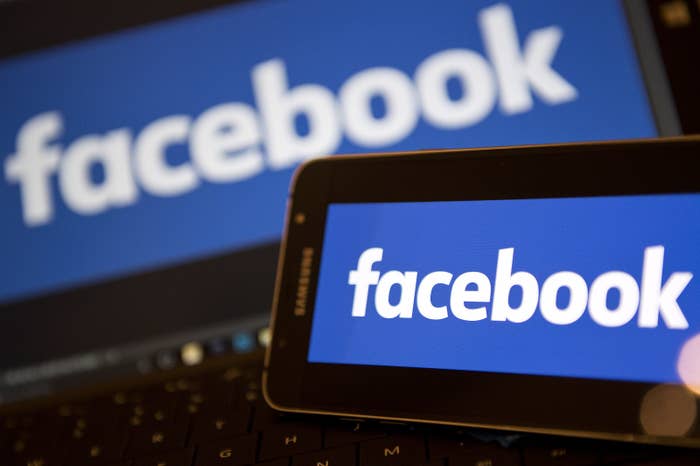
A majority of American adults say they consumed news on Facebook in the past month — but they are deeply skeptical about the trustworthiness of information on that platform, according to a new survey conducted by Ipsos Public Affairs for BuzzFeed News.
The online survey of 1,007 American adults found roughly the same percentage of American adults said they consumed news in the past the month on Facebook (55%) as on broadcast TV (56%). Those were by far the most popular sources of news, followed by print newspapers (39%), cable news (38%), “social media (generally)” (33%), and newspapers’ websites (33%).
But a significant gap emerged when people were asked how much they trust the news they get from these sources. Broadcast TV once again scored the highest, with 59% of respondents saying they trust news from that source all or most of the time.
In contrast, only 18% of respondents trust news on Facebook all or most of the time — and 44% said they rarely or almost never trust news on Facebook. (Another 30% said “about half of the time,” and 8% said “don’t know.”) When looking only at respondents who said they had consumed news on Facebook, 27% trusted the information all or most of the time, according to BuzzFeed News’ analysis of the data.
By that metric, Facebook and “Social media (generally)” had the lowest trust score of any platform as judged by people who said they had gotten news there. (By contrast, 49% of people who had gotten news from Twitter, and 74% of those who’d gotten news from print newspapers, said they trusted news from those platforms all or most of the time.)
Simply put, a majority of Americans are now getting news from a place they say they don't fully trust.
The study raises, but does not answer, additional questions: Do Americans see Facebook as a news source in its own right? Or do the low trust scores reflect the reality that news on Facebook comes from a variety of sources and publishers with different credibility and standards? A Facebook spokesperson declined to comment on the survey, and the company has not published any research it might have done on perceptions of trust on the platform.
Emily Bell, director of the Tow Center for Digital Journalism at Columbia University, said one reason for the Facebook trust gap could be that it offers news from different sources, rather then being a single publisher with its own brand.
“With television, print, and even online sources we choose our outlets,” Bell said. “Over many years it has been proven that 'trust' is often closely linked to identifying with a news source rather than whether or not it actually presents sound facts — Breitbart readers don't trust CNN, and vice versa.”
Danah Boyd, a researcher with Microsoft and founder of the Data & Society research institute, said some people may not view Facebook in the same way as a specific newspaper or TV station. She said the low trust in news on Facebook could indicate that “respondents are signaling that their faith in Facebook is an amalgamation of their confidence in the wide range of news sources out there.”
“This makes sense given that what people consume on Facebook is a plethora of news sources, making it hard to tease out quality in the ongoing stream of headlines and likes,” Boyd said.
It’s unclear whether people who responded to the survey view Facebook as a platform for other publishers, or as a news publisher itself. Mark Zuckerberg recently wrote that “Facebook is a new kind of platform different from anything before it.” The low trust numbers could at least partly be a result of its unique status as an emerging media platform with massive reach.
But other research suggests that trust is not the same as belief — and that beliefs can be shaped even by distrusted sources. A recent online poll conducted by Ipsos for BuzzFeed News found that on average about 75% of American adults believed fake news headlines about the election when they recalled seeing them. The headlines tested were among those that received the highest overall engagement (shares, reactions, comments) on Facebook during the election, which means they received a large amount of exposure on the platform. A research paper published this week also found that just over half of people who recalled seeing viral fake election news headlines believed them to be true.
So while American adults say they don’t trust a lot of the news they see on Facebook, that apparently doesn’t stop many of them from believing it.
The trust findings also raise questions about Facebook's dominant position in the online advertising business, according to Jason Kint, the CEO of Digital Content Next, a trade group representing digital content publishers. He said it’s a problem that both consumers and advertisers are flocking to platforms with trust issues.
“There is clearly a gap between where consumers are getting their news and the media they actually trust, he said. “This same phenomenon is also happening with advertisers' precious dollars. Unfortunately, algorithms, truly ‘absentee owners’ often optimized for profit, won't fix this on their own.”
Facebook now has an initiative underway in the United States and Germany to reduce the spread of misinformation on its platform.
“While we don't write the news stories you read and share, we also recognize we're more than just a distributor of news,” Zuckerberg wrote in December. “We're a new kind of platform for public discourse — and that means we have a new kind of responsibility to enable people to have the most meaningful conversations.”
The survey was conducted online on Jan. 12–13 and, according to Ipsos, has a credibility interval of plus or minus 3.5 percentage points for overall responses.
